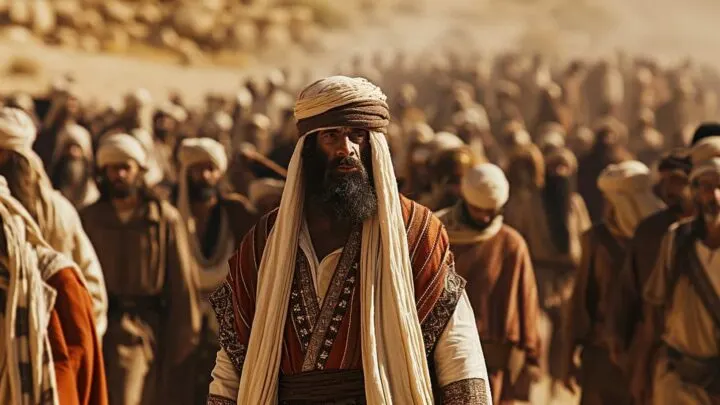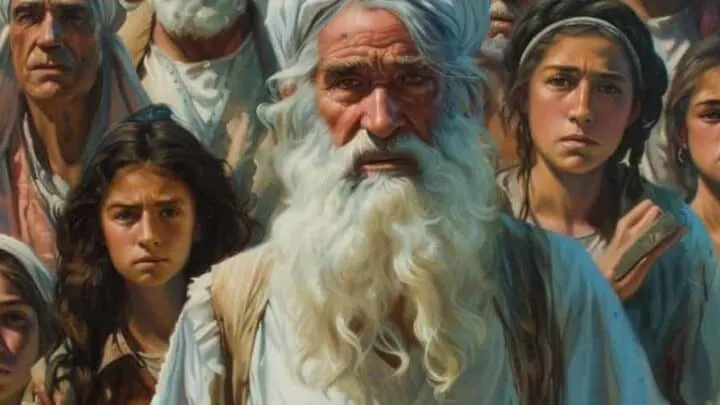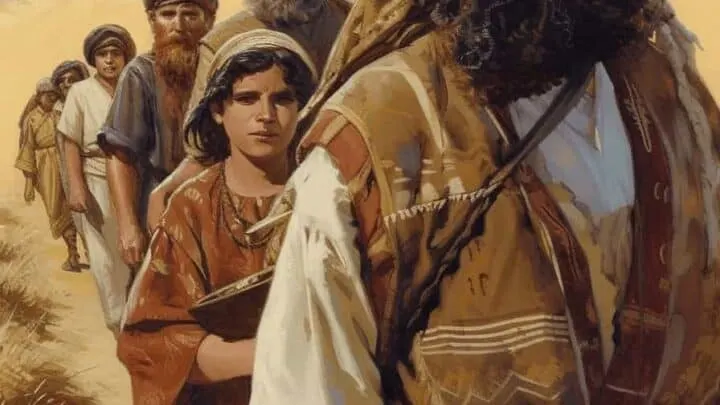Like all the 12 tribes of Israel, the Tribe of Reuben originated from one of Jacob’s sons. But who was Reuben, what does the Bible tell us about his character, and which portion of land was allocated to his tribe?
We look at the Hebrew meaning of his name and explore the pages from the Bible that tell us about his decisions and the consequences that derived from his actions. This is the story of Reuben and his tribe.
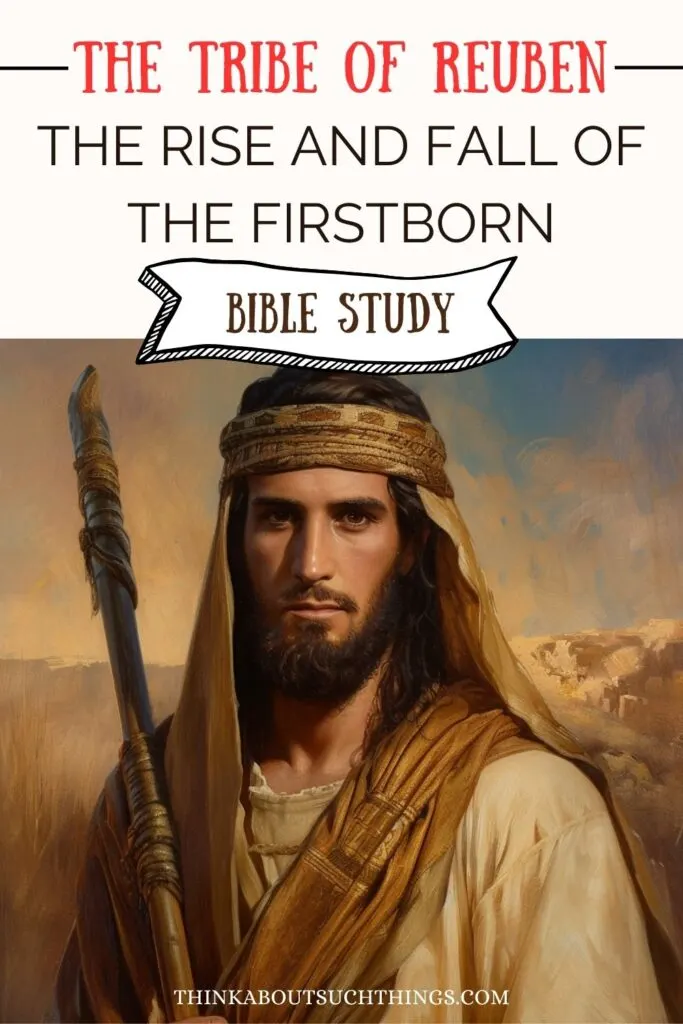
A Son Is Born to Jacob and Leah
The birth of Reuben is recorded in Genesis 29:32, where it says that Leah felt unloved by her husband and was overjoyed that God had opened her womb to bear a son.
Leah became pregnant and gave birth to a son. She named him Reuben, for she said, “It is because the LORD has seen my misery. Surely my husband will love me now.”
She named him Reuben, which is spelled Re’uven in Hebrew and has two meanings.
The word “Re’u” means “to see” or “to behold,” and the second part, “ben,” means “a son”.
When combined, the word Reuben means “behold a son.”
Leah’s sentiment on naming her son Reuben was that she thought Jacob would finally take notice of her because she bore him his firstborn son.
Reuben, The Firstborn Son
Being the firstborn son, Reuben was given honor and power befitting this status, and he was held in great regard by his father, Jacob.
In Genesis 49:3, Jacobs says that Reuben is his “might, the first sign of my strength,” which indicates the power and honor the firstborn son receives. But Reuben makes one big mistake that will cost him his firstborn rights.
The Blessing For Reuben
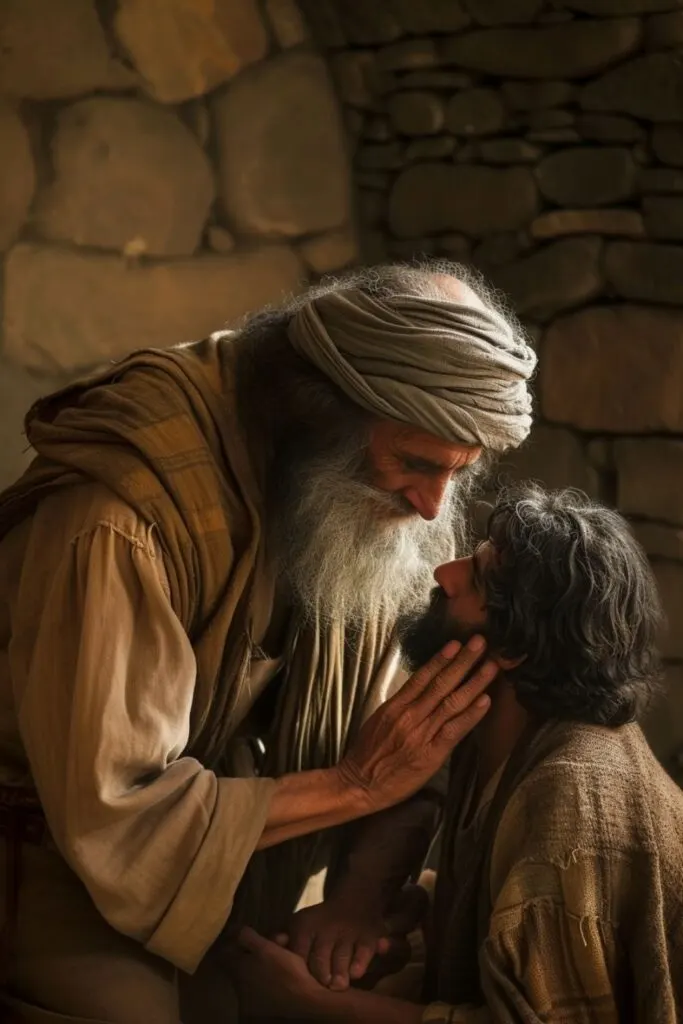
Then Jacob called for his sons and said: “Gather around so I can tell you what will happen to you in days to come.
2 “Assemble and listen, sons of Jacob;
listen to your father Israel.
3 “Reuben, you are my firstborn,
my might, the first sign of my strength,
excelling in honor, excelling in power.
4 Turbulent as the waters, you will no longer excel,
for you went up onto your father’s bed,
onto my couch and defiled it. – Genesis 49:1-4
In Genesis 35:22, we read that Reuben committed the sin of uncleanness by sleeping with Bilhah, Jacob’s concubine.
This sin can be seen as adultery, as Bilhah had sons with Jacob, Reuben’s half-brother. Because of this incest, Jacob declares that Reuben will no longer receive the privileges of the firstborn son.
But, Jacob did not disown Reuben, and he would still be seen as one of his sons.
This sin that Reuben committed would not only leave a mark on his character but, in years to come, would also leave a reproach upon his own family and tribe.
Reuben was often called “unstable as water” because of his mood swings. Sometimes, he was very orderly and steady, but other times, he became undisciplined and wild.
Reuben also had a caring and compassionate side, which we read about in Genesis 37:21, where he pleaded with his brothers, like Simeon, not to kill their younger brother Joseph but rather throw him in a dry well.
Reuben’s plan was to come back later and rescue Joseph. But unfortunately, when he came back, Joseph was gone, as his brothers had sold him into slavery.
Reuben also promised to bring his father’s youngest son back to him after their journey to Egypt. He offered the lives of his two sons should he fail to get Benjamin home safely. (Genesis 42:37)
But the prophecy for Reuben did come true as his tribe was small and insignificant. From his tribe came no ruler, prince, prophet, or judge. But, in Scripture, although Reuben lost his place as the firstborn, his tribe is always mentioned first in the listing of the 12 tribes of Israel.
Historical Events Of The Tribe Of Reuben
The tribe of Reuben was made up of 4 groups, and each group was headed by Reuben’s sons. They were Hanoch, Pallu, Hezron, and Carmi. Scripture does not record the names of Reuben’s wives. The Reubenites were known for their large herds of livestock and required vast grazing land to feed their flocks.
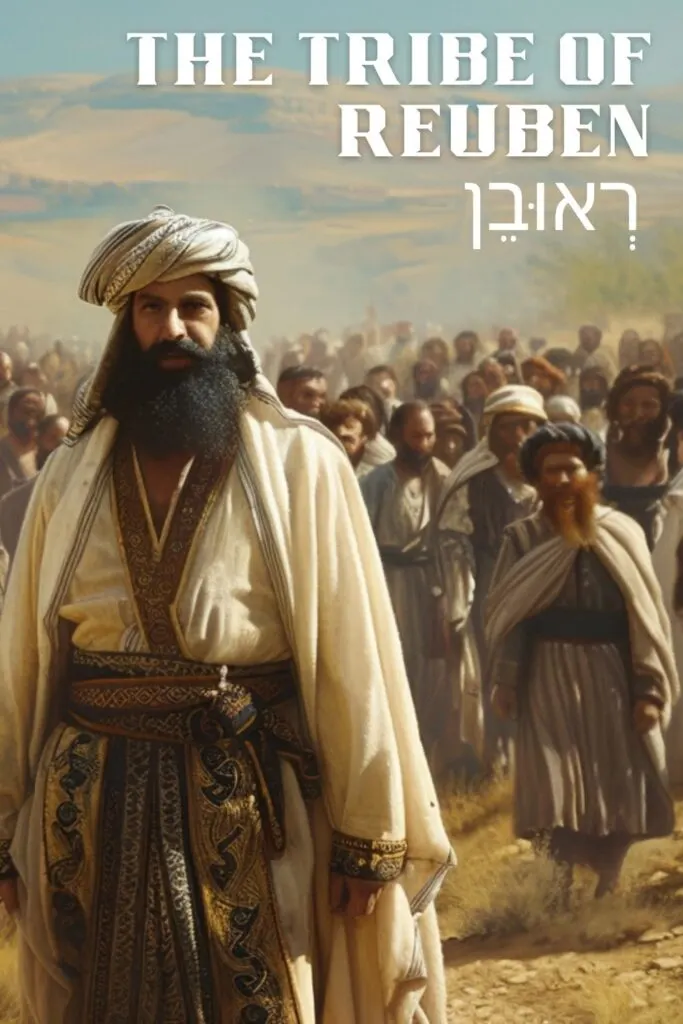
The Tribe Of Reuben Choose Their Land
Moses led the tribes of Israel through the desert to the shores of the Jordan River. Joshua would succeed Moses and lead the tribes across this river to take their place on the land Moses had allotted them. But Reuben’s tribe favored the land on the East side of the Jordan River.
They, together with the tribe of Gad and half of the tribe of Manasseh, approached Moses with the request to settle on this land that was most suited to their large flocks of animals. Moses was not too keen as this meant that these tribes would not settle in the Promised Land that God had given them.
But he conceded when the tribes promised to help the other tribes conquer the land before they would settle on the East side.
So, the tribes of Reuben, Gad, and half of Manasseh left their families and flocks on the East side of the river, and the men crossed the Jordan to join the other tribes in the war to claim the land.
We read in Joshua 22 that after the Israelites possessed the land of Canaan, these tribes were allowed to return to their land on the Eastern side of the Jordan River.
The Tribe Of Reuben Build An Altar
Before the tribes of Reuben, Gad, and half of Manasseh returned to their land, they built a large altar near the Jordan River.
This altar was to honor the God of Israel and as a connection with the other tribes of Israel. The other tribes were initially unhappy with this. Still, after explaining that the altar was intended to symbolize faith and unity, there was no discord between the tribes.
The Reubenites Are Reluctant To Fight
We read in Judges 5:15b-16 that there was an accusation against the tribe of Reuben for not participating in the Prophetess Deborah’s war with Sisera. This attitude showed the tribe was indifferent to helping their relatives during the war.
The decision not to take up arms to help their brethren went against the promise they gave to Moses.
Although the Reubenites helped the other tribes defeat the Canaanites, they also promised to continue to fight for the land West of the Jordan.
In Numbers 32:20-25 Moses warns them that failing to fight means they will sin against the Lord.
The Tribe Of Reuben Is Exhiled
Over time, the three tribes that settled along the East side of the Jordan River were no longer faithful to God and worshipped other gods. We read in 1 Chronicles 5:25-26 that the heads of their families were brave warriors, but their sin against God was too great.
God allowed Pul, Assyria’s king, to defeat Reuben’s tribe and the tribes of Gad and half of Manasseh.
They were enslaved and banished from their fertile lands and were exiled to Halah, Habor, Hara, and the river of Gozan.
Lessons From The Tribe Of Reuben
Our decisions and actions can have a lasting impact on our lives, so we should be wary not to take hasty steps but rather take time to think about the consequences. From the life of Reuben and his tribe, we can learn the following lessons.
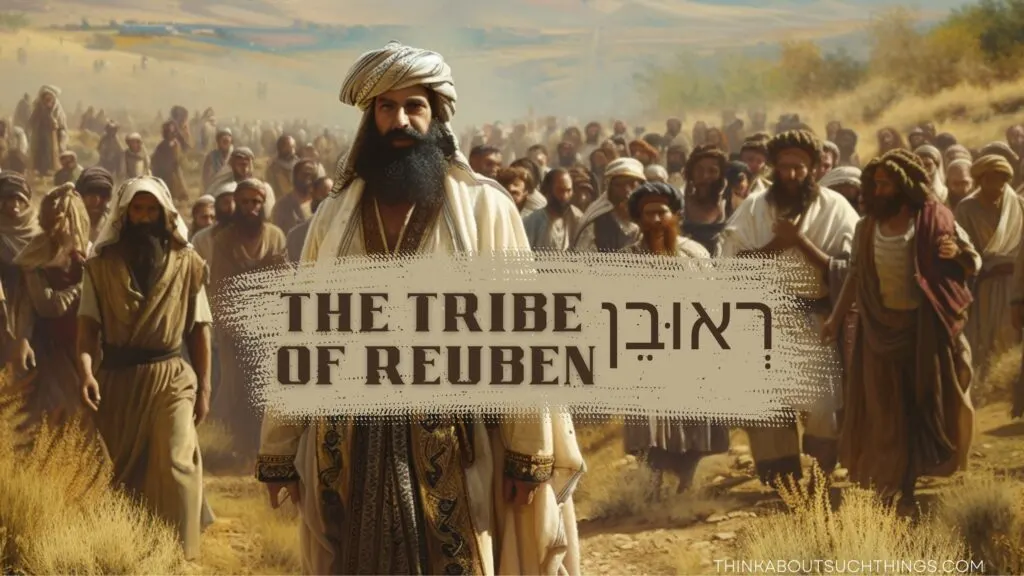
| Lesson | Explanation | Biblical Reference |
|---|---|---|
| Sin Has Personal Consequences | Reuben sleeping with his father’s concubine resulted in him losing his birthright | Genesis 35:22, Genesis 49:3-4 |
| Sin Can Affect Generations | Reuben’s sin impacted his descendants, as his tribe lost preeminence | Genesis 49:3-4 |
| Confession is Important | Reuben did not confess his sin, impacting consequences | Genesis 35:22 |
| God’s Grace | Despite sin, Reuben kept his place among 12 tribes | Genesis 49:3-4 |
| Fulfilled Prophecies | Jacob’s prophecy about Reuben’s tribe came true | Genesis 49:3-4 |
| Importance of Unity | Reuben’s tribe building altar showed unity among tribes | Joshua 22 |
| Keeping Promises | The tribe failed to help brethren in battle as promised | Judges 5:15-16 |
| Consequences of Idolatry | Reuben did not confess his sin, causing consequences | 1 Chronicles 5:25-26 |
Sin Has Personal Consequences
Reuben’s lousy decision to sleep with his father’s concubine would have a lasting impact on him. Because of his sexual sin, he lost the privileges and rights to being the firstborn son.
Reuben did not confess his sin but kept quiet, thinking no one would know. But Jacob found out, and on his deathbed, when it was time to give his sons his blessing, he proclaimed that Reuben would lose his birthright.
This reminds Christians that your sins will always catch up with you. God sees and knows everything, and we must humble ourselves before the Lord and confess our sins. By dying on the cross, Jesus atoned for our sins, so our sins are blotted out when we have true repentance.
Sin Can Affect Generations
The sexual act that Reuben, as head of his tribe, sinned against his father has consequences that will affect his family for years. Jacob says that Reuben’s tribe will not have prominence among the tribes of Israel. The tribe would not hold a prominent position throughout the history of Israel.
Christians need to be aware that our actions can have consequences that affect the people around us. We must ask God to guide us in our actions and decisions so that they may not harm or negatively affect our families.
The Magnificence Of God’s Grace
Although Reuben lost his prominent position as the firstborn, God did not let Jacob disown him. He still gave him a place in the history of the Israelites. The Grace of God and His kindness will always be with us, even though we sin.
The tribe of Reuben lost its prominent place in the history of Israel because Reuben sinned against God and slept with his father’s concubine. This sin resulted in Reuben losing his birthright and position as the firstborn son.
After traveling through the desert, the tribe opts to settle on the eastern side of the Jordan River and not in Canaan, the promised land.
After many years, the tribe turns away from God and worships other nations’ gods. The consequence of this sin is that the king of Assyria banishes them from their land, and they are exiled and enslaved.
The Tribes of Israel
Unlock the fascinating histories & profound legacies of the 12 Tribes of Israel in our epic Bible study series! From Reuben's birthright to Levi's priestly roles, Judah's kings to Joseph's prominence - explore in-depth the unique paths, impacts & symbolic meanings of each tribe.
Gain revelatory insights into their conquests, failings, blessings & destinies across this comprehensive journey through Scripture. Prepare to have your understanding of Israel's tribes forever transformed!
The Tribe of Simeon: The Fierce and Fatal Son
Unravel the mysteries of the often overlooked Tribe of Simeon in our comprehensive Bible study. Explore their conquest of Canaanite cities, dispersal among Judah's territory, and ultimate absorption. Gain eye-opening insights into this tribe's complex history and legacy.
The Tribe of Levi: Set Apart for Service
Discover the sacred legacy of the Tribe of Levi, entrusted as priests & keepers of the tabernacle. Our insightful Bible study unveils their unique role, responsibilities, and how they upheld worship for all Israel. Explore this devoted tribe's profound spiritual impact.
The Tribe of Issachar: Navigating the Times & Seasons
Learn the profound wisdom of the Tribe of Issachar, celebrated for their deep understanding of the Torah. Our enlightening Bible study reveals their role as renowned teachers of the law and brave warriors. Discover the inspiring legacy of this remarkable tribe.

Melissa is a passionate minister, speaker and an ongoing learner of the Bible. She has been involved in church and vocational ministry for over 18 years. And is the founder of Think About Such Things. She has the heart to equip the saints by helping them get into the Word of God and fall more in love with Jesus. She also enjoys family, cooking, and reading.
She has spoken in churches in California, Oregon, Texas, and Mexico and has been featured in Guidepost Magazine and All Recipes Magazine. Read More…

